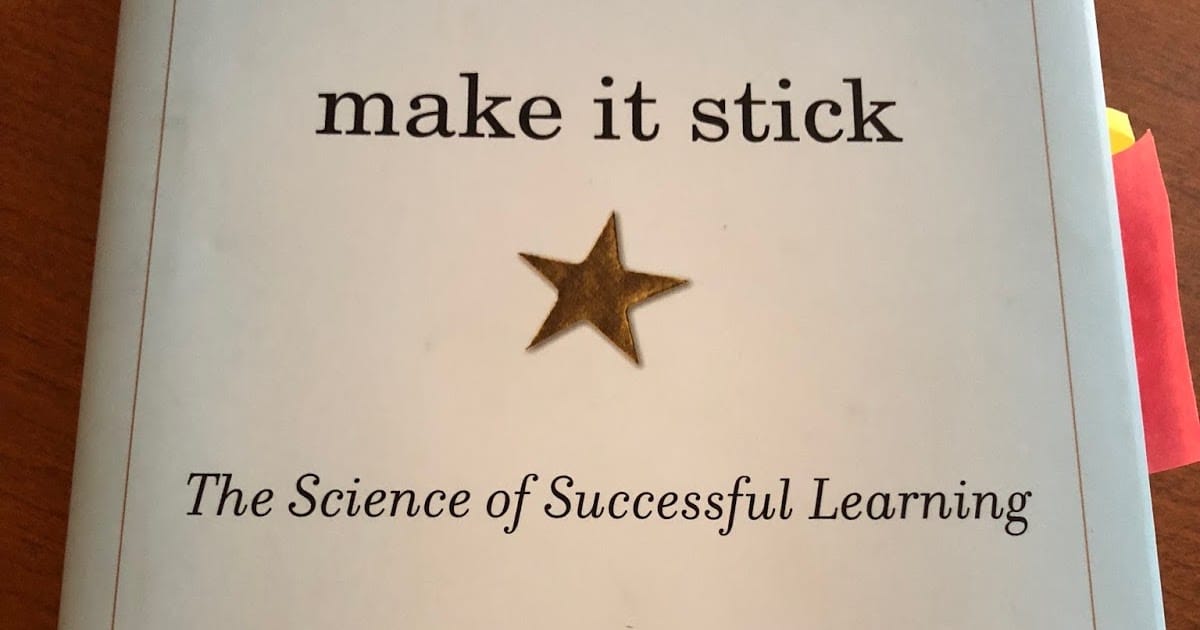When learning is hard, you are doing important work.
Make it stick is a book about how we learn and why we do a generally poor job of recognizing how we best learn. The authors cut through a lot of superstitions and anecdotes that we tell ourselves about how to study and how to learn so that the material actually stays with you for the long term.
The single most important concept that I took away from this book is the idea of incorporating active recall. Active recall is the act of trying to consciously retrieve whatever you just read from your mind.
Say you want to learn something about photosynthesis and you just read ten pages about it. Rather than re-reading the notes or highlighting what you wrote, which promotes fluency, or a feeling that you understand the concept, you should attempt to write down as much as you remember about the material.
This active recall serves multiple functions:
- Active recall is a skill that you can improve with practice. The more frequently you attempt to recall information the better your brain gets at recalling.
- It is an excellent self test of our knowledge. If you read five pages of information but can only recall 2 or 3 bullet points worth of information it tells you that you either weren't paying attention or you didn't have a strong enough background in the concepts to actually absorb anything of meaning
- There is a direct connection between your brain and hand, so writing information down reinforces your memory even as you are actively recalling.
- When we compare what we recall to what we missed we are able to gauge our gaps - figure out what we understand well and what we still need to understand. This is probably the most valuable part because it allows us to actively gauge where we are in our learning journey
Part of why our memory has gotten so poor is the fact that we rarely need to recall things because we have become dependent on our phone. It is amazing that I can still recall my best friends home phone numbers but struggle to remember my moms cell phone number. The reason I remember those phone numbers is that I had to remember the numbers. Now I no longer am penalized for not knowing a phone number so I struggle with recalling the information.
But if I were to read the number and then immediately write it down, and then do that again an hour later and a day later I would probably commit the number to memory.
As someone who struggles remembering people's names I want to make an effort to practice active recall so that I don't continue with that horrible tendency.
Our capacity to remember information is nearly limitless when we learn to reinforce information and give it proper context.
This goes to the bigger picture - learning needs to be effortful in order to be meaningful. If the learning isn't meaningful then your brain won't retain it. So at the root of learning there has to be effort.
Our collective endeavors to make learning "easier" for students is backwards. The easier we make learning the more we give students the illusion that they get the concepts. So when we simplify books, or have students read shorter texts or do things in an effort to "streamline" the learning, we are likely doing them a disservice. When there is no friction in the effort of learning there is no actual learning happening.
I see this happen all the time. I explain concepts and students feel confident that they get the ideas. Then they put little or no effort into reinforcing the material. So their brain just prunes all the effort into learning so they don't retain the information.

From the brains standpoint this makes total sense. Reinforcing neural pathways takes a lot of effort. The brain literally needs to lay down layers of fat, known as myelin, in a pathway to make neural activity go faster. This is an ardous process, which is why learning complex concepts can give you a headache. So if you do something once or twice and don't reinforce it then your brain will lose the work.
This isn't to say that videos or efforts to make learning fun are wasted. They are useful in so far as they help engage a student. But without an effort and a drive to create conscious work in the act of learning and the act of recalling the activities are a complete waste.
Practical takeaways
- Quiz yourself as a form of active recall. Don't think of a test as punishment think of it as feedback to what you actually understand and where you are weak.
- Repeated retrieval so that the material doesn't disappear after a day or two.
- Be comfortable with failure - it isn't a defect it is simply and area for improvement.
- Teach what you've learned to someone a few steps behind you. You don't understand the content if you can't explain it.
This might not have been the most important point of the book but it resonated strongly with me as a teacher. I always strive to learn more and more about my area of teaching.
But this year I am teaching chemistry, a subject I don't know well. The benefit of that is that the areas that I am struggling with I know the students will struggle with. This makes me more sensitive to their potential weaknesses than I am in biology. I have been teaching biology long enough where I struggle to remember what was hard for me to retain.
As a practice it is good for any learner to attempt to teach a concept to someone who is behind them. So for high school students they should take the concepts they are learning and figure out how to explain it to a middle school or elementary school student. This helps them as learners because they have to learn the material well enough that they can explain it to someone younger.
The other concept that really resonated with me is just how fluid the brain is and how wrong so many people have been in terms of thinking of their intellect as a fixed value.
That isn't to say that IQ isn't real or that there are no differences in innate intelligence in people. These things are real but overall we seem to put significant amounts of weight on the idea of static and immutable limitations. I think these ideas might be liberating to some people because it is easier to not try if they think that they are born with limitations that they cannot break free from.
It is way easier to avoid reading a book if you were told by someone that you are a "visual learner". It is way easier to accept a low SAT score if you have decided that standardized tests are inherently biased against whatever group you happen to identify with. It is much easier to accept so many things if you believe that you have no power to affect the kind of change you might want.
If, on the other hand, you decide that you have some power to affect your intelligence, like you have power to affect your muscle development, then you have a responsibility to maximize whatever potential that you have.
Curiosity is an amazing environmental multiplier. I don't consider myself to be significantly smarter than the average individual, but I have seen that I am significantly more curious about how things work than most people. Maybe that curiosity is inherent in me but I see curiosity in every child I have ever met. That trait seems to be driven out of us at some point much to our detriment.
Is this book worth reading?
Like any good teacher I try to evaluate book quality using a simple rubric. My current rubric is on a 9 point scale:
- Did I learn something valuable? I generally understand the importance of not cramming for tests and the idea of spacing out studying. The idea of active recall is the most valuable of the ideas for me and one that I will implement in my classes and for myself. (3/3)
- Would I re-read the book? It was a good book and had nice anecdotes but I don't think that I would re-read the book given all the great books that are out there. I would probably strengthen my understanding of some of the strategies from re-reading the book but I don't feel like I would actively seek out a second read. I might change this criteria when evaluating self help books because I can only think of a few books in this category that I have ever read more than once. (2/3)
- Would I gift the book to other people? I absolutely would give this book to other people - particularly teachers who are frustrated with their students and their overall lack of academic achievement. I would also give this book to any teenager or college age student who is frustrated with their academic performance. I think anyone who implements these strategies will inevitably improve their academic performance and I would be thrilled to give this book to help them achieve. (3/3)
The rubric is a holistic assessment - 8/9 does not mean a 88% in my view it simply means that there are some great strengths in this book but the re-readability is not sky high.
I think this book is immensely valuable for everyone. I strongly recommend reading it. Teachers and students will derive an enormous amount of value from this book if they are willing to implement the strategies suggested. I think I would have had significantly better grades if I had done just half of these things.


Member discussion: